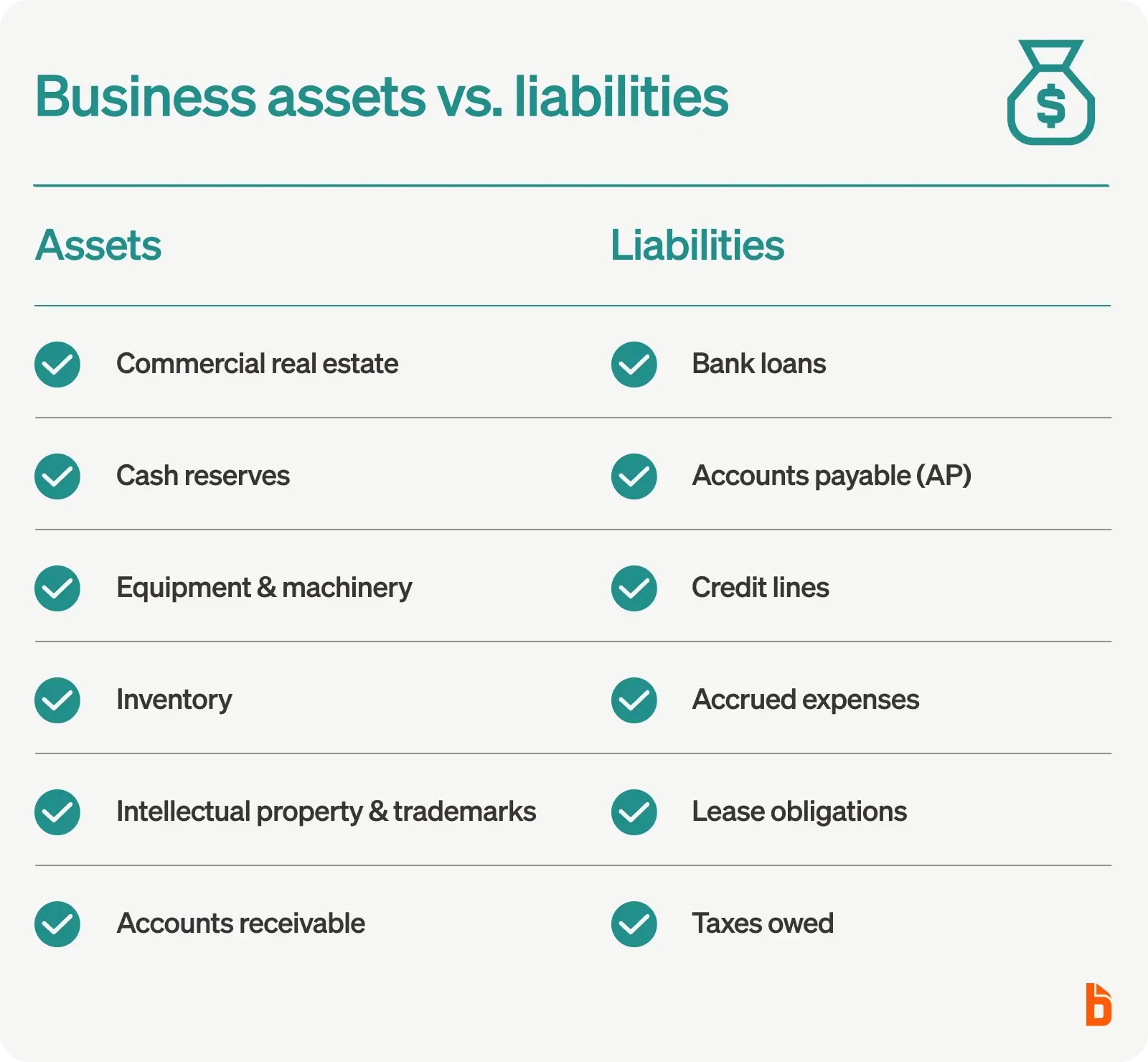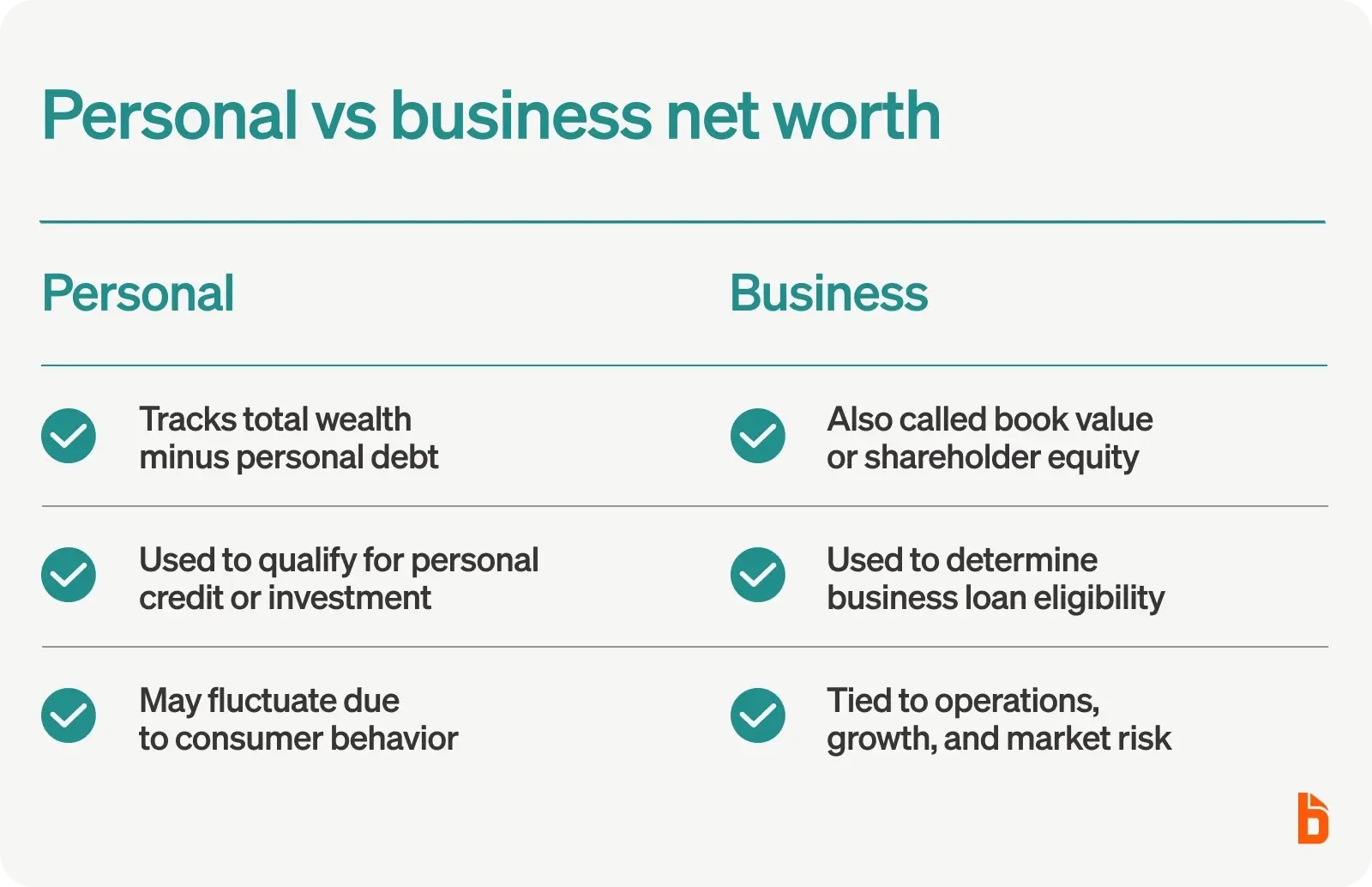Net worth, also known as book value for a business, can help you understand the true wealth of an individual or business. It's tempting to look only at assets when you think about what you're worth—like your bank account, 401(k), or other retirement savings—but what about that student loans total amount?
Your net worth considers the current market value of both your assets and debts (often called liabilities) for a more realistic picture of your financial well-being. For businesses, it works the same way.
What is net worth?
Net worth is the value of everything a person, business, or other entity owns, with a catch: you have to subtract out everything they owe.
In practice, you'd start by adding up the actual market value (or cash value) of things like bank accounts, mutual funds, savings bonds, retirement savings, investment accounts, commercial bonds, precious metals, the value of your home, commercial buildings, rental property, and other assets.
Then, you'd subtract out things like the current principal balance remaining on college or student loans, auto loans, total credit card debt, home mortgage principal or other real estate mortgages, commercial property or other mortgage principal, and so on.
The rest of this article dives into more financial detail, but that's the heart of it.
Definition of net worth
Put simply, net worth is the total value of what a person or a business owns minus what they owe. More specifically, it is the value of all of their owned assets minus the liabilities that they owe.
It can be used to determine if individuals qualify for certain investment strategies or financial products, such as hedge funds, structured products, and other more complex or alternative investments.
A big part of calculating net worth is knowing the difference between assets and liabilities and being able to list all of them correctly so one can get an accurate result.

Assets vs. liabilities
Assets and liabilities can be hard to properly define, and the particular categories contained in each can easily be forgotten as well.
Assets
An asset is anything a person or business owns that has monetary value.
Assets include all cash—whether in checking, savings, or retirement accounts—and certain investments, such as stocks and bonds that would equate to cash when sold. Stocks and bonds are also often referred to as liquid assets.
Fixed assets should also be included in a net worth calculation. These include real estate, equipment, vehicles, life insurance policies, jewelry, and much more.
Annual income is not considered among one’s assets when calculating net worth.
Liabilities
Liabilities are obligations that deduct financial resources from one’s assets, such as loans, accounts payable (AP), and debts.
Any money that a person or business owes is a liability. This includes credit card debt and loans which can include but are not limited to: mortgages, personal, auto, student, payday, and title loans.
How to calculate net worth using its formula
The formula to calculate net worth is:
You can use the formula to calculate your net worth or the net worth of a company. Either way, a net worth calculator works the same way. That net worth statement comes down to the value of what's owned minus total outstanding debt.
Positive vs. negative net worth
Net worth can be either positive or negative. Having a negative net worth means that there are more liabilities than assets. In contrast, positive net worth means that assets outweigh liabilities.
A positive net worth can indicate good financial health, especially if it is continually increasing.
A negative net worth means the outstanding debt is higher than total assets. While a negative net worth can be concerning, it might also be a simple matter of strategy. Smart investments with annual asset growth may be worth borrowing to meet the original purchase price. Companies often "leverage" their expansion by borrowing against their assets. This can lower current net worth while raising projected net worth over the long run.

Business vs. personal net worth
In business, net worth can also be called “book value” or “shareholders' equity.” For a business, their net worth is the same as their equity.
Lenders will look at a business's book value to determine if it is financially healthy enough to qualify for a loan. If a business has outstanding debt or a negative net worth, a creditor may not be confident in the company's ability to repay its loans and will likely not approve a loan for it.
For individuals, net worth is still important, because it can also be used to qualify for loans or to become an accredited investor. It is important for the individual to know their net worth so they can use it as an assessment of their personal financial health.
Example of net worth
Finding out one’s net worth is a simple calculation—the difficult part is putting together the list of assets and liabilities that go into it.
Here is an example of calculating an individual’s net worth:
Christopher Johnson is a successful entrepreneur and investor. Let's say Christopher's assets amount to $5 million, including his real estate holdings, investment portfolio, and savings accounts. His liabilities amount to $2 million, including a mortgage, several credit card balances, and other outstanding debts.
Johnson’s net worth would be calculated as follows:
Through this simple calculation, one can determine that Christopher Johnson's net worth is $3 million.
Now, here is an example of a business’s net worth:
Veridian Ventures is a multinational company operating in various industries. Let's say Veridian Ventures’ total assets amount to $100 million, including cash reserves, real estate holdings, stocks, and intellectual property rights. Its total liabilities amount to $50 million, including outstanding debts and loans.
The business's book value would be calculated as follows:
$100 million - $50 million = $50 million
Thus, Veridian Ventures’ net book value as a company is $50 million. This will also appear on the balance sheet as total equity.

How to increase net worth
The best way to increase net worth is by reducing liabilities while increasing assets. Working with a professional or virtual financial advisor or certified financial planner can be extremely beneficial in helping individuals or businesses increase their net worth.
Here are some strategies that can effectively impact a person or business’s net worth growth:
Budget
Developing a well-planned budget is a fundamental step towards increasing net worth. A strict budget will assist in prioritizing expenses, cut unnecessary costs, and allocate more funds toward debt reduction and savings.
Pay off debts
A company, or an individual, can undertake debt reduction strategies like the “debt snowball” or “debt avalanche.” The debt snowball method involves paying off the smallest debts first, while the debt avalanche method focuses on tackling debts with the highest interest rates, both effectively reducing debt liabilities over time. Negotiating with creditors may also be an option to alleviate the burden of debt.
Save
By diligently setting aside a portion of one’s income into a savings account, a person can accumulate a healthy amount of savings over time. This can provide a safety net and create opportunities for future investments.
Invest
Investing is another way to grow assets and exponentially increase net worth. Partnering with a financial institution or seeking advice from a professional can help you make informed investment decisions, providing a diverse and successful portfolio while aligning with your financial goals.
Why is net worth important?
Net worth is an important financial metric because it provides a snapshot of an individual or a business's financial health and stability. Here are a few reasons why calculating net worth is so important:
Measure of financial progress
By calculating their net worth periodically, individuals and businesses can assess if their wealth is increasing or decreasing. It also serves as an effective benchmark when evaluating the effectiveness of financial strategies and investment decisions.
Financial planning
Net worth is also crucial for decisive financial planning. It helps individuals and businesses set realistic goals, make informed decisions about saving, investing, and budgeting, and determine major expenses such as buying real estate, equipment, starting a business, or retirement planning.
Risk assessment
Net worth helps individuals and businesses understand how well they can weather financial setbacks or unexpected events. For example, higher-than-average net worth can often provide a buffer against financial emergencies—such as equipment failure, emergency repairs, or other unexpected expenses—and reduces the likelihood of an individual or company falling into debt.
Investment analysis
Net worth helps investors determine how much of their total wealth is allocated to different asset classes. By comparing net worth to investment portfolios, individuals and businesses can evaluate diversification strategies, assess risk exposure, and adjust their investment allocations accordingly.
Financial positioning
A higher net worth indicates a stronger financial position, which can help negotiate better unsecured loan terms, business partnerships, or attract investment opportunities.
Wealth management
Net worth serves as a basis for wealth management decisions—determining asset allocation strategies, estate planning, tax management, and risk mitigation techniques to preserve and grow wealth over time.
Build your net worth today
While increasing your net worth significantly takes time, one of the quickest ways a business can improves its financial position is to get paid faster (collecting on its accounts receivable more efficiently) and optimize its bill pay (accounts payable) by taking advantage of early discounts and making sure it isn't paying late fees.
BILL Accounts Receivable and BILL Accounts Payable can help you automate your receivables and payables, optimize your cash flows, and improve your cash position.
See what BILL Accounts Receivable and BILL Accounts Payable can do for your business.


